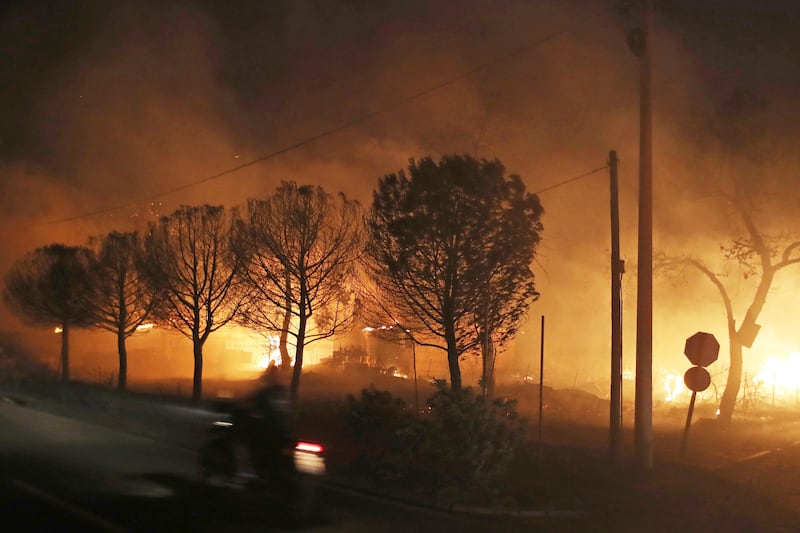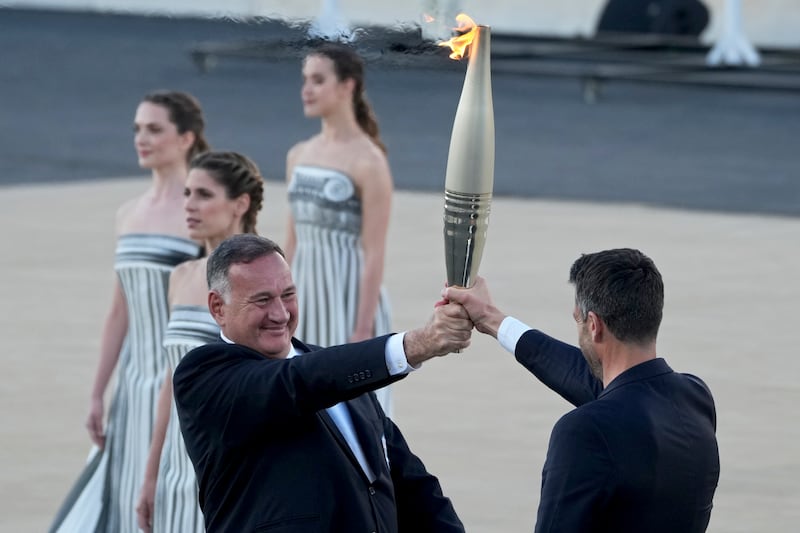Activists took to the streets in Asian capitals and European cities on Wednesday to mark May Day with protests over rising prices and government labour policies, and calls for improved workers’ rights.
May Day, which falls on May 1, is observed in many countries to celebrate workers’ rights. May Day events also give many an opportunity to air general economic grievances or political demands.
Police in Istanbul, Turkey, used tear gas and fired rubber bullets to disperse thousands of people who were attempting to break through a barricade and reach the city’s main Taksim Square in defiance of a government ban on celebrating Labour Day at the landmark location.
At least 30 people, mostly members of a left-wing party, were earlier detained for trying to break through the barriers at another police blockade.

President Recep Tayyip Erdogan’s government has long declared the area off limits for rallies and demonstrations on security grounds, but some political parties and trade unions vowed to march to the square, which holds symbolic value.
In 1977, unidentified gunmen opened fire on a May Day celebration in Taksim, causing a stampede in which 34 people died.
On Wednesday, police erected barricades and sealed off all routes leading to Taksim Square. Public transport in the area was also restricted.
Only a small group of trade union representatives was permitted to enter the square to lay a wreath at a monument in memory of victims of the 1977 incident.
Riot police apprehended some 30 members of the left-wing People’s Liberation Party who tried to break through the barriers.

In Athens, several thousand protesters joined May Day marches, as related strikes disrupted public transport and national rail services across Greece.
Nationwide strikes were led by the country’s largest union, which has demanded a return to collective bargaining after labour rights were scrapped during Greece’s severe 2010-18 financial crisis.
In Paris, police fired tear gas as thousands of protesters marched through the French capital, seeking better pay and working conditions. Twenty-nine people were arrested.
Pro-Palestinian groups and anti-Olympics activists joined the rally, chanting slogans in support for people in Gaza.

A group of protesters set makeshift Olympic rings on fire to show discontent with the Summer Games that start in less than three months.
France’s unions have warned of a strike during the Games if the government does not adequately compensate people forced to work during summer holidays.
Government officials have failed to meet with union leaders, said Sophie Binet, the general secretary of the CGT union, one of France’s largest. “How do you expect it to go well if the authorities don’t respond to our simplest demand?” she said.
France remains tense, with recent protests from teachers, police officers and farmers following huge demonstrations last year against the rise in retirement age.
Unions have filed an open-ended strike notice to pressure the government into concessions. They said all sectors, including hospitals, will go on strike during the Games if the government does not adequately compensate people who are forced to work during the summer holidays.

In Indonesia, workers voiced anger at a new law they said violates their rights and damages their welfare, and demanded protections for migrant workers abroad and a minimum wage raise.
About 50,000 workers from Jakarta’s satellite cities of Bogor, Depok, Tangerang and Bekasi were expected to join May Day marches in the capital, said Said Iqbal, the president of the Confederation of Indonesian Trade Unions.
They gathered amid a tight police presence near the National Monument park, waving the colourful flags of labour groups and chanting slogans against the Job Creation Law and loosened outsourcing rules during a march to Jakarta’s main sports stadium, Gelora Bung Karno.
“With the enactment of this law, our future is uncertain because many problems arise in wages, severance pay and the contract system,” said Isbandi Anggono, a protester.
Last year, Indonesia’s parliament ratified a government regulation that replaces a controversial law on job creation, but critics said it still benefits businesses.
The law was intended to cut bureaucracy as part of President Joko Widodo’s efforts to attract more investment to the country, which is Southeast Asia’s largest economy.

In Seoul, the South Korean capital, thousands of protesters sang, waved flags and shouted pro-labour slogans at the start of their rally on Wednesday.
Organisers said their rally was primarily aimed at stepping up criticism of what they call anti-labour policies pursued by the conservative government led by President Yoon Suk Yeol.
“In the past two years under the Yoon Suk Yeol government, the lives of our labourers have plunged into despair,” said Yang Kyung-soo, leader of the Korean Confederation of Trade Unions, which organised the rally.
“We can’t overlook the Yoon Suk Yeol government. We’ll bring them down from power for ourselves.”
KCTU union members decried Mr Yoon’s December veto of a Bill aimed at limiting companies’ rights to seek compensation for damages caused by strikes. They also accuse his government of handling the 2022 strikes by truckers too aggressively and insulting construction sector workers whom authorities believed were involved in alleged irregular activities.

Since taking office in 2022, Mr Yoon has pushed for labour reforms to support economic growth and job creation. His government has vowed to sternly deal with illegal strikes and demand more transparent accounting records from unions.
“The remarkable growth of the Republic of Korea was thanks to the sweat and efforts of our workers. I thank our 28.4 million workers,” he said in a May Day message posted on Facebook. “My government and I will protect the precious value of labour.”
Rally participants later marched through central Seoul.
Similar May Day rallies were held in more than 10 locations across South Korea on Wednesday. Police said they had mobilised thousands of officers to maintain order, but there were no immediate reports of violence.
In Nigeria, unions criticised government efforts to ease the cost of living and demanded bigger salary increases. Inflation is the highest in 28 years, at more than 33%.
In South Africa, pro-Palestinian demonstrators joined May Day events.
In Kenya, President William Ruto called for an increase in the country’s minimum wage.
In Lebanon, pro-Palestinian marchers mingled with workers demanding an end to a miserable economic crisis.
“Politicians do not feel the pain of the worker or the economic conditions,” said one demonstrator, Abed Tabbaa.
In Iraq, protesters demanded better wages, the reopening of closed factories and the end to privatisation of certain businesses.
Tens of thousands Sri Lankans paraded through the capital as the country struggles through its worst economic crisis, two years after declaring bankruptcy.
Discontent has grown over efforts to increase revenue by raising the price of electricity and imposing taxes on professionals and small businesses.
In Japan, more than 10,000 people gathered in Yoyogi park in central Tokyo for a May Day event, demanding salary increases that they said could sufficiently offset rising prices.
During the rally, Masako Obata, the leader of the left-leaning National Confederation of Trade Unions, said dwindling wages have put many workers in Japan under severe living conditions and widened income disparities.
“On this May Day, we unite with our fellow workers around the world standing up for their rights,” she said, shouting “Banzai!” or “long life”, to all workers.

In the Philippines capital, Manila, hundreds of workers and left-wing activists marched and held a rally in the scorching summer heat to demand wage increases and job security amid soaring food and oil prices.
Riot police stopped the protesting workers from getting close to the presidential palace.
Waving red flags and holding up posters that read: “We work to live, not to die” and “Lower prices, increase salaries”, the protesters rallied in the street, where they chanted and delivered speeches about the difficulties faced by Filipino labourers.
Poor drivers joined the protest and called to end a government modernisation programme they fear will eventually lead to the removal of their dilapidated jeepneys, a main mode of public transport, from Manila’s streets.






